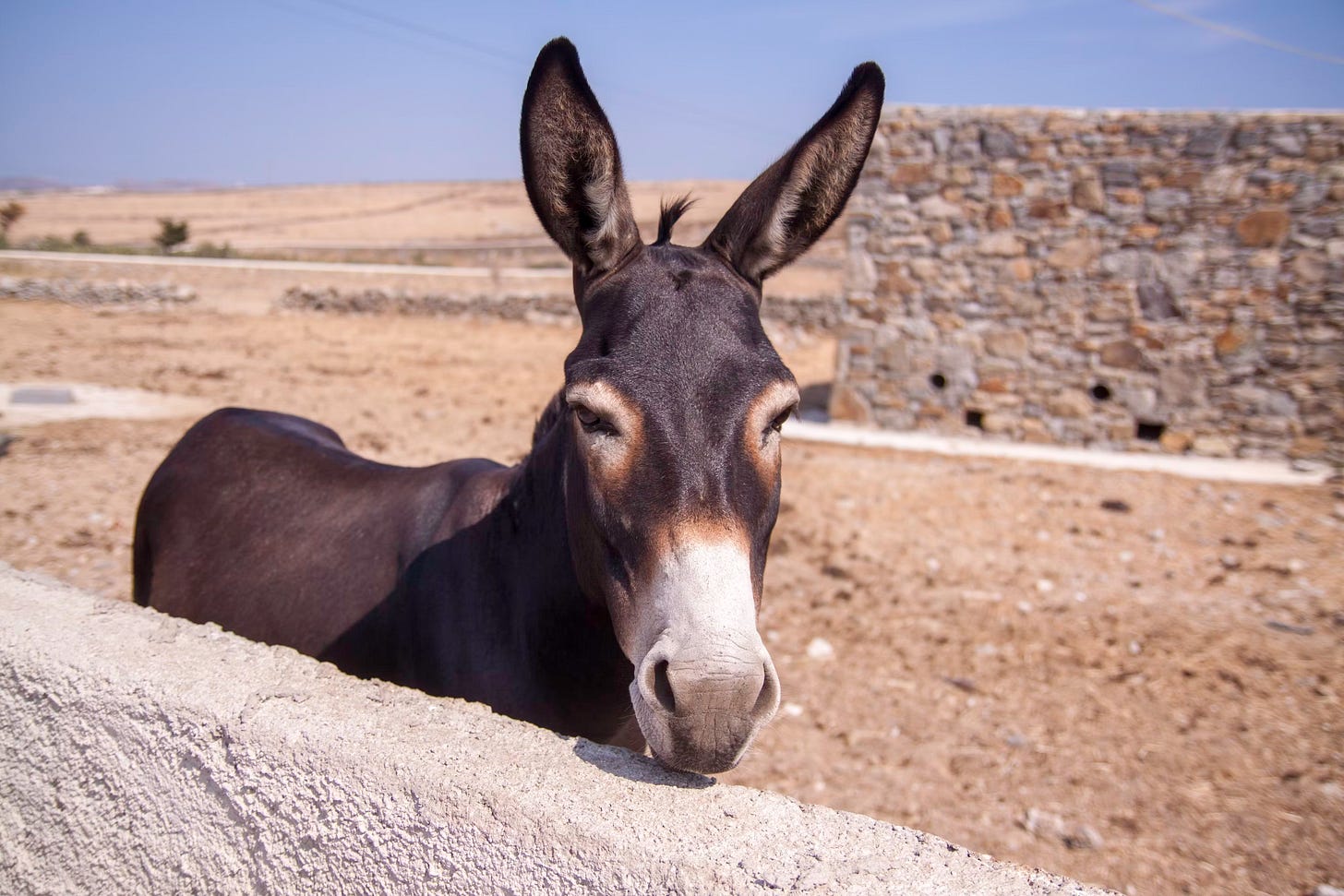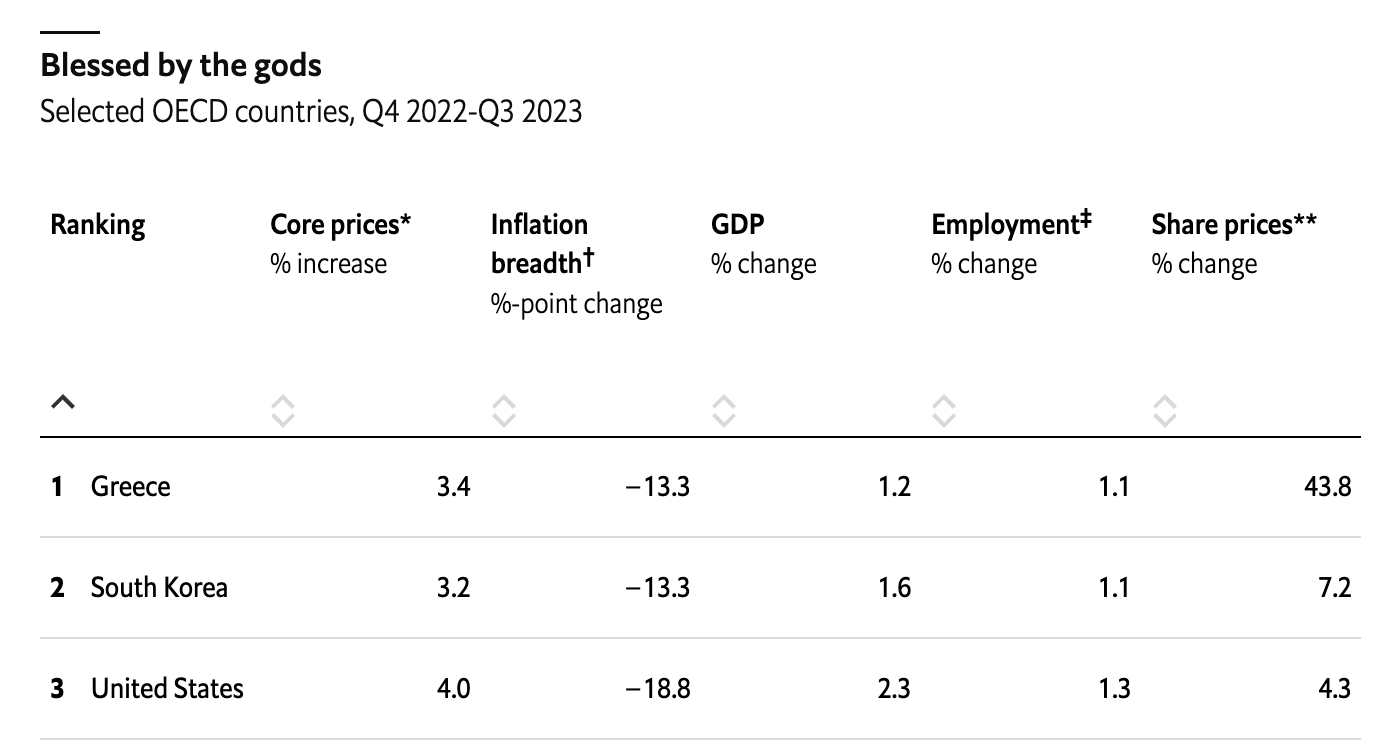Welcome to another issue of Changing Greece.
If you like what you are reading, consider joining 1,921 other readers eager to see and help Greece change by subscribing below:
Today, we’ll talk about donkeys.
🫏 The Donkey Enterprise
Unicorn startups? Zebra companies? Camel ventures?
I beg to differ. I’m all for the “Donkey Enterprise.”

Donkeys are highly intelligent, super strong, curious, not easily startled, have great memory and employ a highly developed sense of self-preservation. They are also underestimated — and often live up to 50 years.
Forget about exotic names, fancy VC lingo, fake-it-till-you-make-it narratives and insane valuations. e/cc is cool, but only if you live in the gilded terra of Silicon Valley.
Let’s get back to the basics.
What is the Donkey Enterprise?
In today’s world, successful businesses must survive waves of financial crises, remain sturdy in an era of constant change, do hard work and just keep on walking.
Donkeys have been faithful “beasts of burden” for farmers, builders, and transporters since ancient times. They’ve been the undervalued, and often ridiculed, silent workers that enabled much of early global trade and human civilization to flourish.
In the post-COVID “global reset”, it will be businesses that exemplify characteristics of “donkey work” — and adjust their business models accordingly — that will successfully make it through, prosper and last for decades (or even centuries).
Characteristics of successful Donkey Enterprises
How do successful donkey enterprises look like? Let’s have a look:
High sense of self-preservation: In difficult times, trust your intuition. Plan ahead for an uncertain future. Avoid unnecessary competitive battles. Focus on sustainability from the very beginning. You are playing the long, Lindy game.
Long institutional memory: Build a strong internal knowledge base and preserve lessons learned. Studying your business’ mistakes is a key part to building a better business, engraving resilience and pre-empting unpredictable surprises in the future. Create an environment that retains your best team members for the long run — humans are more important drivers of lasting education than codified texts.
Innate curiosity: Ask “why” all the time. Questioning the environment around you helps affirm your assumptions and validate your hypotheses. Create a culture that cultivates curiosity, makes people comfortable to ask the hard questions, and allow good ideas to come, be discussed, implemented and even celebrated from everywhere in the enterprise. Always hire very curious people. Keep learning.
Strong foundations: Companies are its people. The selection and composition of the founding team, together with the first hires, is critical. Early team members set the tone and the direction of a company’s culture. It is exceptionally hard to course-correct at later stages. Make sure to get that right at the beginning, and regardless of your starting point, always keep investing on your people.
Hard work, few short cuts: Hockey-stick growth is amazing, but extremely rare. There is no shame in building things slowly but iteratively. There is no shame in failures either. Hard work does not guarantee successful outcomes, but there is no long-term success without continuous hard work. Do not try to game the system. Take only few but well calculated shortcuts.
Cut through the noise and focus: Do not worry about what other people are saying. Have your antennas open and listen, but make sure to focus only on what matters. You cannot do everything everywhere all at once. Prioritize judiciously. Complete 3 company goals exceptionally well rather than 30 with average results.
Why are we talking about donkeys?
Donkeys are no strangers to a country like Greece. They are a big part of our history. While we often looked down on them, they have surprisingly a lot to teach us.
Ravaged by a gut-wrenching depression, Greek entrepreneurs are often stereotyped, much like donkeys. And yet, they have worked painstakingly against all odds, faced strenuous conditions, were forced to do more with less, and just kept on going.
The last decade was marked by VC/PE affluence and central bank free money. Greece was (un)lucky not to participate in this fiesta of SPAC-ghetti profligacy, as we were battling the sins of our previous reckless extravagance.
But the era of abundance is now over, and a new one of hard pragmatism begins. Greek companies and entrepreneurs that experienced, adjusted to and survived its deep crisis (with the scars to prove it) are well positioned to do well in it.
Any enterprise that faces adversity with an absolute commitment and fighting spirit as if each day is its last, knowing that there is no alternative to hard work, bump after bump, has a strong chance to succeed in this new era.
This is why I am betting heavily on the Donkey Enterprises of our time.
Donkeys of the world, unite!
🙌 Greece is changing
67% of Greeks aged 16-74 used e-government services last year. This is almost twice the number compared to 10 years ago — an impressive change for a country that has resisted change for decades.
Recent improvements in digitization of the Greek state are starting to pay dividends — and Greeks are paying attention. Aided by the push during the COVID era by then Minister Pierrakakis and his team, a large number of services that would take citizens hours or even days to complete in person now take minutes or seconds to finish online.
Did every single process become simplified? Has every bureaucratic obstacle been erased? Can you now do everything online? Has the digitization process led to the serious staffing reduction of the continuously bloated Greek public sector? Well, the answer for each of these questions is still a big fat Greek no.
But that’s ok. Greece has not just moved from 0 to 1. We are actually at level 10 now. Still a long way from 100, but this is serious progress. Heck, this month the Greek state portal gov.gr even introduced a surprisingly effective AI chatbot!
As long as we continue making headway, avoid the trap of digitizing bureaucracy and steer clear from introducing new digital single points of failures, I’ll remain hopeful.
💰 Economy & Investments
Average salary in Greece increasing, but still far below EU average. There has been undeniable improvement in the past years but the gap with EU still remains large. A fair take depends on both vantage points: progress is real, but we need to do 10x that.
Updated McKinsey Report on Greece’s Economy. A decade after McKinsey’s 2012 seminal report, ACG’s Institute of High Growth & Prosperity released an update.
Greek National Productivity Board Annual Report 2023, published by KEPE. Greek labour productivity has improved, but vast gaps still remain compared to EU average.
Contribution of manufacturing in economy at 15-year high. Manufacturing is back to pre-crisis levels, with GVA as % of GDP rising to 9.1% in 2022 (still far behind EU).
Many Greek products and services remain way above EU average prices. Inflationary pressures are part of the reason, greedflation and cartel-like behavior are another.
Deep dives in the Greek economy by Alpha Bank Economic Research. You can read all about the ICT sector, retail trade, logistics, agri-food chain and judicial efficiency.
Grimaldi buys majority stake of port of Heraklion. A Grimaldi subsidiary acquired 67% of the Heraklion Port Authority for about $80M from the Greek government.
🤖 Tech & Startups
Greek VC Financing Report for 2023-2024. The latest annual issue of Startups in Greece is finally out, once again led by Found.ation with support from EIT and HDBI. A must read with good information about the Greek startup and venture ecosystem.
Investors behind 5G-Phaistos consider creation of new fund. The first fund had a thematic focus on 5G tech. What will the (potential) second one entail?
Impact of GenAI on the Greek economy. A detailed survey by Deloitte, SEPE and EKT. Findings indicate early-stage GenAI adoption (only 15% have experimented).
10% of top papers at NeurIPS were written by Greeks. NeurIPS is the greatest AI conference in the world. Top performance by Greek scientists has been consistent.
Mist.io announces its acquisition by Dell. Mist will become part of Dell NativeEdge. Another successful acquisition of a Greek company by an American tech giant.
Elastic is opening up an office in Athens. The global leader in the field of enterprise search recently received authorization from the Greek Ministry of Development.
Build your own self-driving car. Eugenides Foundation has launched a cool project for high school and university students to teach them about robotics and AI/ML.d
🏅 Celebrating Greek wins
Greece was named The Economist’s country of the year for 2023, recognizing the progress and efforts made over the past years. The top British magazine provided a second recognition, choosing Greece’s economy as its best performer for the year.
Greek team among winners of NeurIPS 2023 AI competition organized by Google. The team from Archimedes unit won 6th place (out of 7 winners) among 1120 entries.
Greek woman named farmer of the year at European Congress of Young Farmers. Argyro Koutsouradi, founder of Myrovolos Organics, has already been making waves.
Young Greek trader comes 3rd at US investing championship. Marios Stamatoudis has clinched a 3rd place at the Stock Division, with an impressive 230.5% performance.
🎓 Education and R&D
R&D expenditure in Greece exceeds €3 billion in 2022, growing by 16.6% vs 2021. ‘R&D Intensity’ (i.e. R&D expenditure as a % of GDP) now stands at 1.49% for 2022 vs 1.46% in 2021. On a European level, Greece ranks 14th among the EU27 countries.
Non-public, non-profit universities ante portas in Greece. PM Mitsotakis vouched that a new law permitting the creation of private universities will be voted in Jan.
Impact factor of Greek academics rising. Greece scores high in terms of average citations per publication, Greek institutions cited, and high impact publications.
A Greek school with zero carbon footprint. 7th Junior High School of Agrinio is one of the most cutting-edge in the country, aptly labeled as a “school from the future.”
🤯 Did you know…
The designer of the Mini was half Greek? Alec Issigonis (”Αλέξανδρος Ισηγόνης”) was the creative mind behind the Mini, 2nd most influential car of the 20th century. Born in Smyrna in 1906, Alec was evacuated to Malta ahead of the Great Fire of Smyrna and then moved to the UK after his father’s death. Issigonis designed many other landmark cars, including the Morris Minor, and was bestowed the title of “Sir” by the late Queen Elizabeth.
Until next time!










Donkeys are known for their patience . Certainly a much needed trait for anyone starting or running an enterprise in Greece . Frustration with bureaucracy and ever changing tax terrain do need a lot of donkey s patience to ride through . I agree though that Greek entrepreneurs are resilient , hard working and resourceful much like the often unappreciated donkeys . And they deliver despite all odds.